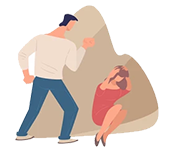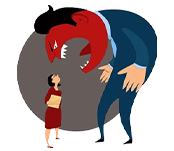- Helping You Understand Domestic Violence -
What Is & Is Not Abuse:
Abuse is one person using power and control OVER another. Both partners cannot have that kind of control. The abused partner may fight back, but there is a difference between abuse and self-defense.
Abuse is not about both partners just "fighting it out" all the time. Abuse can happen regardless of the length of relationship or living situation.
Signs Of Abuse

Physical Abuse

Stalking & Cyberstalking

Emotional & Verbal Abuse

Sexual Abuse
